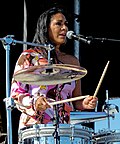Recipients
| Year [I] | Image | Recipient | Occupation(s) [II] | Nationality | Ref. |
|---|---|---|---|---|---|
| 2004 |  | Antonio Aguilar | Singer songwriter actor film producer | Mexico | [3] |
 | Roberto Carlos | Singer songwriter | Brazil | ||
 | Willie Colón | Singer trombonist songwriter producer | United States | ||
 | José José | Singer | Mexico | ||
 | Mercedes Sosa | Singer | Argentina | ||
| 2005 |  | Rocío Dúrcal | Singer actress | Spain | [10] |
| — | Generoso Jiménez | Trombonist arranger | Cuba | ||
 | Jorge Ben Jor | Singer songwriter | Brazil | ||
 | Sérgio Mendes | Pianist composer arranger producer | Brazil | ||
 | Johnny Pacheco | Composer multi-instrumentalist producer | Dominican Republic | ||
 | Sandro | Singer actor | Argentina | ||
| 2006 |  | León Gieco | Singer songwriter | Argentina | [11] |
 | Graciela | Singer | Cuba | ||
 | César Camargo Mariano | Pianist songwriter producer | Brazil | ||
| — | Richie Ray & Bobby Cruz | Pianist singer (respectively) songwriters | Puerto Rico United States | ||
 | Paloma San Basilio | Singer | Spain | ||
| — | Alberto Vázquez | Singer actor | Mexico | ||
 | Johnny Ventura | Singer songwriter | Dominican Republic | ||
| 2007 |  | Alberto Cortez | Singer songwriter | Argentina | [12] |
 | Lucho Gatica | Singer | Chile | ||
 | Olga Guillot | Singer actress | Cuba | ||
 | Os Paralamas do Sucesso | Rock, reggae, ska, pop trio | Brazil | ||
 | Los Tigres del Norte | Norteño music quintet | Mexico | ||
 | Chavela Vargas | Singer | Mexico | ||
| 2008 |  | Vikki Carr | Singer | United States | [13] |
 | Cheo Feliciano | Singer songwriter | Puerto Rico | ||
 | Astrud Gilberto | Singer | Brazil | ||
| Angélica María | Singer actress | Mexico United States | |||
 | María Dolores Pradera | Singer actress | Spain | ||
 | Estela Raval | Singer | Argentina | ||
| 2009 |  | Candido Camero | Conguero | Cuba | [14] |
 | Beth Carvalho | Singer | Brazil | ||
 | Charly García | Pianist singer songwriter | Argentina | ||
 | Tania Libertad | Singer | Peru Mexico | ||
| — | Marco Antonio Muñiz | Singer | Mexico | ||
| — | Juan Romero | Songwriter | Mexico | ||
| 2010 |  | João Donato | Singer-songwriter pianist | Brazil | [15] |
| — | Las Hermanas Márquez | Singers | Cuba | ||
 | Armando Manzanero | Composer | Mexico | ||
 | Joseíto Mateo | Singer | Dominican Republic | ||
| — | Jorge Oñate | Singer | Colombia | ||
 | Susana Rinaldi | Singer | Argentina | ||
| 2011 |  | Joe Arroyo | Singer songwriter | Colombia | [16] |
 | Gal Costa | Singer | Brazil | ||
 | José Feliciano | Singer songwriter | Puerto Rico | ||
 | Álex Lora | Singer songwriter | Mexico | ||
 | Les Luthiers | Humorous group musicians | Argentina | ||
 | Rubén Rada | Singer songwriter percussionist | Uruguay | ||
 | Linda Ronstadt | Singer | United States | ||
| 2012 |  | Luz Casal | Singer | Spain | [17] |
 | Leo Dan | Singer songwriter | Argentina | ||
 | Rita Moreno | Singer actress | Puerto Rico United States | ||
 | Milton Nascimento | Singer songwriter | Brazil | ||
 | Daniela Romo | Singer | Mexico | ||
 | Poncho Sanchez | Percussionist | United States | ||
 | Toquinho | Songwriter guitar player | Brazil | ||
| 2013 |  | Oscar D'León | Singer musician | Venezuela | [18] |
 | Juan Formell | Musician Arranger Songwriter | Cuba | ||
 | Roberto Menescal | Musician songwriter producer | Brazil | ||
 | Totó la Momposina | Singer interpreter | Colombia | ||
 | Palito Ortega | Singer actor producer | Argentina | ||
 | Eddie Palmieri | Pianist music director musician | United States | ||
 | Miguel Ríos | Singer songwriter actor producer | Spain | ||
| 2014 |  | Willy Chirino | Singer songwriter musician producer | Cuba United States | [2] [19] |
 | César Costa | Singer actor producer radio host author mentor | Mexico | ||
 | Carlos do Carmo | Singer | Portugal | ||
 | Dúo Dinámico | Singers composers producers actors | Spain | ||
 | Los Lobos | Musical group | United States | ||
 | Valeria Lynch | Singer actress | Argentina | ||
 | Ney Matogrosso | Singer | Brazil | ||
| 2015 |  | Gato Barbieri | Saxophonist | Argentina | [20] [21] |
 | Ana Belén | Singer | Spain | ||
| — | Ángela Carrasco | Singer | Dominican Republic | ||
 | Djavan | Singer songwriter guitarist | Brazil | ||
 | El Gran Combo de Puerto Rico | Salsa music orchestra | Puerto Rico | ||
 | Víctor Manuel | Singer | Spain | ||
 | Pablo Milanés | Singer songwriter guitarist | Cuba | ||
| 2016 |  | El Consorcio | Vocal group | Spain | [22] |
 | Eugenia León | Singer | Mexico | ||
 | Ricardo Montaner | Singer songwriter | Argentina Venezuela | ||
 | Ednita Nazario | Singer | Puerto Rico | ||
 | Piero | Singer songwriter | Argentina | ||
| 2017 |  | Lucecita Benítez | Singer | Puerto Rico | [23] |
 | João Bosco | Singer musician | Brazil | ||
| | Ilan Chester | Singer songwriter | Venezuela | ||
 | Víctor Heredia | Singer | Argentina | ||
 | Los del Río | Music duo | Spain | ||
 | Guadalupe Pineda | Singer | Mexico | ||
 | Cuco Valoy | Singer | Dominican Republic | ||
| 2018 |  | Erasmo Carlos | Singer-songwriter | Brazil | [24] |
 | Dyango | Singer musician | Spain | ||
 | Andy Montañez | Singer | Puerto Rico | ||
 | José María Napoleón | Singer-songwriter | Mexico | ||
 | Chucho Valdés | Pianist bandleader composer arranger | Cuba | ||
 | Wilfrido Vargas | Bandleader singer | Dominican Republic | ||
 | Yuri | Singer | Mexico | ||
| 2019 |  | Eva Ayllón | Singer | Peru | [25] |
 | Joan Baez | Singer songwriter | United States | ||
 | José Cid | Singer songwriter | Portugal | ||
| — | Lupita D'Alessio | Singer actress | Mexico | ||
 | Hugo Fattoruso | Keyboardist singer composer | Uruguay | ||
 | Pimpinela | Music duo | Argentina | ||
 | Omara Portuondo | Singer dancer | Cuba | ||
 | José Luis Rodríguez | Singer | Venezuela | ||
| 2020 | No award due to the COVID-19 pandemic | [9] | |||
| 2021 |  | Martinho da Vila | Singer | Brazil | [26] |
 | Emmanuel | Singer songwriter | Mexico | ||
 | Pete Escovedo | Musician | United States | ||
 | Sheila E. | Musician | United States | ||
 | Fito Páez | Singer songwriter musician | Argentina | ||
 | Milly Quezada | Singer | Dominican Republic | ||
 | Joaquín Sabina | Singer songwriter | Spain | ||
 | Gilberto Santa Rosa | Singer | Puerto Rico | ||
| 2022 |  | Rosario Flores | Singer | Spain | [27] |
 | Myriam Hernández | Singer Songwriter | Chile | ||
 | Rita Lee | Singer Songwriter | Brazil | ||
 | Amanda Miguel | Singer | Argentina | ||
 | Yordano | Singer Songwriter | Venezuela Italy | ||
| 2023 |  | Carmen Linares | Singer | Spain | [28] |
 | Manuel Mijares | Singer Songwriter | Mexico | ||
 | Arturo Sandoval | musician | Cuba United States | ||
 | Simone | Singer | Brazil | ||
 | Soda Stereo | Rock musical group | Argentina | ||
 | Ana Torroja | Singer songwriter | Spain | ||
| 2024 |  | Albita | Singer | Cuba | [29] |
 | Lolita Flores | Singer | Spain | ||
 | Alejandro Lerner | Singer songwriter | Argentina | ||
 | Los Ángeles Azules | Cumbia musical group | Mexico | ||
 | Draco Rosa | Singer songwriter | Puerto Rico | ||
 | Lulu Santos | Singer songwriter | Brazil | ||
| 2025 |  | Susana Baca | Singer | Peru | [30] |
 | Enrique Bunbury | Singer | Spain | ||
 | Ivan Lins | Singer songwriter | Brazil | ||
 | Pandora | Musical vocal trio | Mexico | ||
 | Olga Tañón | Singer | Puerto Rico | ||
^[I] Each year is linked to an article about the Latin Grammy Awards ceremony of that year.
^[II] The artists occupation(s) are listed on the Special Awards page on the Latin Grammy Award website.